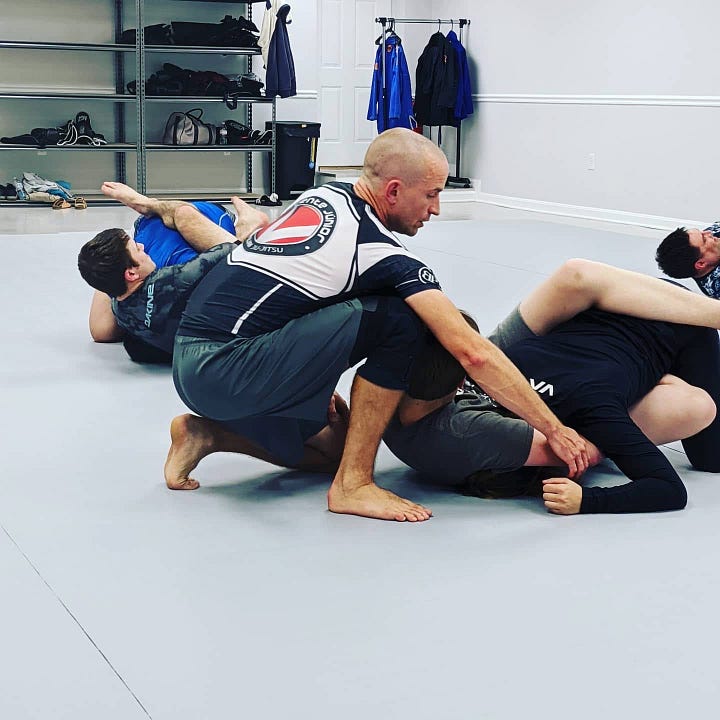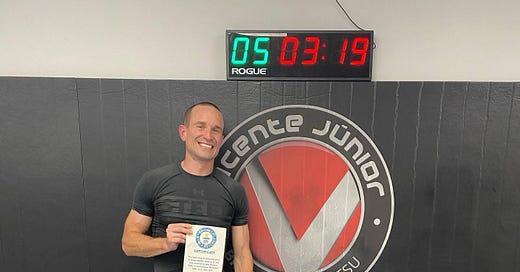A Naval Officer's Secrets to Navigating Stress
Resilience expert Kyle Shepard talks managing overload and regaining control.
They say mindset is everything.
I know this. And yet, lately, I feel frayed.
In the past couple of weeks, I’ve lost control of the steering wheel. First, a kitchen fire (we’re fine, but no stove for now). Then, a stolen car (it was recovered after a few hours, but still!). The house is a mess, and this morning, following the fire remediation crew’s cleanup-and-cupboard reorg, I couldn’t find the coffee canister. (Take the crown jewels, but DON’T MESS WITH THE BUSTELO!)
Yes, I know I should zoom out to the bigger picture: we’re alive, we’re healthy. But I’m tired. The hamster wheel feels relentless. My hormones are out of whack. I missed an important email the other day. And I’m knee-deep in prep for spring bodybuilding competitions as a 50-year-old (am I really doing this?). I could really use a mindset-boost injection.
Time to talk to Kyle Shepard. The 38-year-old Naval officer runs a Substack called Resilient Mental State, which reads like the perfect mix of Sun Tzu wisdom and my younger brother telling me to cut the crap. He writes about the physical and mental aspects of resilience: how to reframe negative thinking, embrace discomfort, and navigate concepts of control, clarity, and sacrifice.
Based in Maryland, Kyle is trained in Combat and Operational Stress Control, a Defense Department initiative to combat burnout in military personnel. He’s worked with teams at Marine Corps Base Camp Lejeune and Naval Base Guam to help sailors recognize and manage combat stress, and is a trained audiologist who manages hearing conservation programs for sailors struggling with the impact of hearing loss and tinnitus (ringing in the ears). Oh, and he competes in Brazilian Jiu-Jitsu, and devotes several hours coaching that and Mixed Martial Arts three days a week at St. Mary’s Brazilian Jiu-Jitsu in Callaway.


“I’ve always been fascinated by why some people stay calm in chaos while others crumble,” he said in an interview with me over the weekend.
Lately, I’ve been ruminating on that, too: how can I manage my time better? How can I prioritize the threads of my life? Should I be harder on myself? Less hard? Do I need to chill out? Meditate? Something?
So I asked him for advice. And I’m so glad I did.
Here are four takeaways from our recent conversation.
***
Don’t make it disappear. Make it manageable.
Kyle talked about the stresses he helps sailors navigate—like tinnitus, a condition that doesn’t necessarily go away but can have real psychological repercussions. The key, he explained, is managing the stress that comes with it.
“I talk a lot about pain management,” he said. “If someone perceives their pain as a 9 or 10 out of 10, the goal isn’t to bring it down to zero; you can’t walk someone back to perfection. But you can move it from a 9 to a 6 or 7.”
That resonates. It’s not realistic to expect my stress to drop to zero—nor would I want it to. I love the work I’m doing, and being in build-mode is both exciting and important. But bringing my stress level down to a manageable six or seven? That feels right.
"Get to" vs. "Have to"
As I rattled off my responsibilities, I kept saying, I have to do this, I have to do that. Kyle would gently stop me with a reminder: “You don’t have to do any of it. You’re choosing to.”
It’s true that I’m not burning the candle at both ends, he said. More like four ends. “And they’re all awesome ends!” Something about that shift—from have to to get to—was unexpectedly comforting. It put me back in the driver’s seat. When I frame my workload as something I get to do, the stress eases, and suddenly, I’m steering again.
Power of the Breath
I admitted to Kyle that the idea of meditation feels like psychic torture. It’s just not my thing.
But I do love the sauna. Every time I hit the gym, I make a point to sit in the warmth for a few minutes, to relax and stretch in the dry heat before lifting. Kyle suggested adding a simple breathing exercise while I’m in there: focusing on slow inhales through the nose and exhales through the mouth.
Using the breath as an anchor to quiet the mind, he explained, can be incredibly grounding. “Focusing on nothing but your breath is mindfulness—it’s meditative,” he advised.
And that? That I can get behind.
One Small, Hard Thing
This month, Kyle challenged his readers to dedicate a few minutes each day to mastering a single exercise. The focus? Wall sits. The goal? Three and a half minutes—if not more. Participants can check in daily to a group chat to confirm they’ve done it, creating a sense of accountability.
“The body’s ability to physiologically adapt and optimize performance based on what we consistently put it through is amazing,” Kyle says. Plus, exercise can feel isolating, and having a community check-in makes it both encouraging and fun.
My coach already asks me to spend 10 to 15 minutes at the end of my assigned workout each day on any exercises I choose—so lately, I’ve been using that time for Kyle’s challenge.
My current best? 3.5 minutes.
Next goal? 4 minutes.
I think I can do it.





Nice piece. I'm a big fan of Kyle and what he's working on at Resilient Mental State. His notion about breaking off small bites on a mastery journey — like the wall sit — are spot on. The small bites eventually add up to a fuller plate. My 2025 "resolutions" were all in this vein, including a dead hang for grip strength. https://nottoolate.substack.com/p/3-little-things-to-build-strength.
Plus, finding a crevice of calm amid chaos is a huge secret weapon.
Great read and all solid advice. 100% on the 'get to vs have to' and perspective on EVERYTHING. IMO, perspective is what keeps those who are going 1000 mph with their hair on fire and look calm and cool different from those who fall apart when life just gets a little out of whack. LOVE the do one hard thing challenge, although I typically do that myself once per day. I aim to do something uncomfortable every single day as much as possible. Big and small. There's a really great Huberman podcast with David Goggins where they discuss this part of the brain (can't remember what it's called) that grows when we do something challenging and shrinks when we don't (I'm really simplifying it here), but the more we use it the bigger it gets, and the bigger it gets, the more resilient and able to take on challenges we are. If we don't use it, it shrinks. It's pretty great to be able to grow your resilience muscles. Because let's face it, lie is NOT going to get any easier, but we CAN get better at dealing with it.